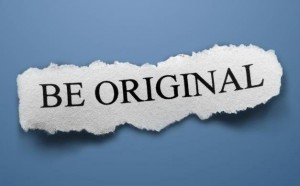I love it when people say “Be Yourself.” It is simple, gives people a sense of empowerment, and the phrase could be used in almost any situation that requires advice. For example, If one has to speak in front of a crowd and if one asks someone for advice, I am sure that person would say “Be Yourself,” or for those individuals who have gone on a blind date and they ask a friend how they should act, the person would probably say “Be Yourself,” or during an interview, if an individual asks a mentor or someone he or she trusts how should that person should act, they say . . . that’s right . . . “Be Yourself.” Being yourself, means that one acts naturally, in such a way that it is truly that person! But what about when it comes to branding and marketing; is it better to be perfect and to appear completely flawless, or can a brand be completely imperfect and be successful?
In a blog written by Rohit Bhargava, the argument is made that being “real” and communicating a relatable message is a competitive advantage compared to being perfect, and that companies that are trying to be flawless are starting to be a thing of the past. The consumers value a brand experience that is unique. “We value something that is real above everything else.” (Bhargava, 2013 p#4) Bhargava, goes on to use Trader Joes as an example of a brand that has mastered “being themselves” and offering a great brand experience to its customers. “What Trader Joe’s has figured out about offering a great experience is something every brand should consider … sometimes being perfect isn’t as important as just having a real personality and being yourself.” Bhargava gives the example of how Trader Joes constantly changes the name of their brand, Trader Giottos for Italian food, or Trader Ming’s for Chinese food, and they make a standard grocery store experience interesting (Bhargava p#5) Trader Joes has found a way to be distinctive with their brand. Peter Coughter also draws from this notion of “being real,” as being advantageous to achieving success in a world where everyone tries to be different. Despite that fact that Coughter is speaking in the context of giving a presentation – his reasoning strongly applies to core marketing principles, and parallels Bhargava’s points about being novel. He opines: “It’s a conversation, only you are doing most of the talking. A lot of people have a hard time with this idea. I see it almost every time I work with folks at an agency. They cling to the notion that they need to be ‘different’ than they are in ‘real life’ . . . what they end up accomplishing is being boring.” (Coughter p. 15)
“Being real” is easy on a personal level, if one is in touch with who one is; however, “being real” might actually prove to be more difficult in a marketing situation. Struggles may develop when a brand has lost touch with who the target market is and, more importantly, how they adapt to change. Communication of the brand is pivotal and is the paramount way to create a unique space and a niche for the brand to operate in. Moreover, if brand can create a space for itself, it is okay to be imperfect; there are no standards, no rules, no precedents explaining how to act, what to say, what to convey to a target market. I agree with Bhargava and Coughter that the payoff to be real and being oneself is greater than trying to presume a false persona, and it does give a brand a competitive advantage.
-Alexandra Waterworth
Bhargava, Rohit. (2013, February 21). Why Being REAL Matters More Than Being Perfect. Infuencial Marketing Blog . Retrieved from http://www.rohitbhargava.com/2013/02/why-being-real-matters-more-than-beingperfect.html?utm_source=feedburner&utm_medium=feed&utm_campaign=Feed%3A+rohitbhargava+%28Influential+Marketing%29
Coughter, Peter. (2012). The Art of the Pitch, Persuaion and Presentation Skills that Win Business. New York: Palgrave MacMillan.



8 Responses to Be Original!